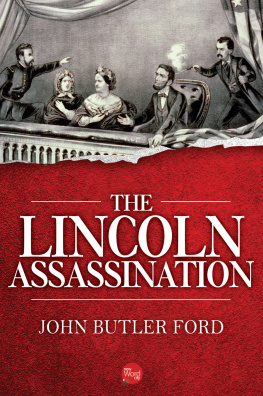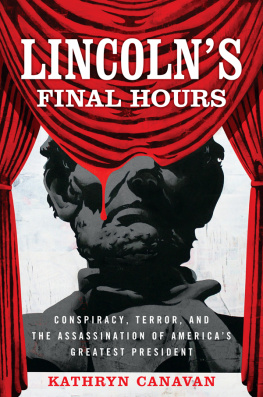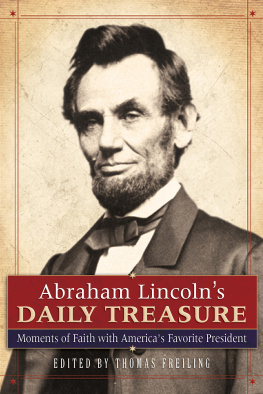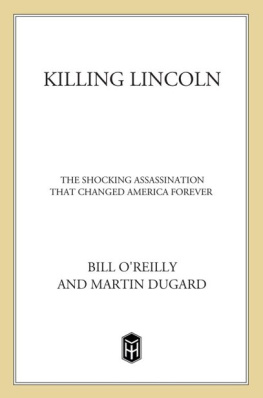Lincolns
Final Hours
LINCOLNS
FINAL HOURS
Conspiracy, Terror, and
the Assassination of Americas
Greatest President
KATHRYN CANAVAN

Due to variations in the technical specifications of different electronic reading devices, some elements of this ebook may not appear as they do in the print edition. Readers are encouraged to experiment with user settings for optimum results.
Copyright 2015 by The University Press of Kentucky
Scholarly publisher for the Commonwealth,
serving Bellarmine University, Berea College, Centre College of Kentucky, Eastern Kentucky University, The Filson Historical Society, Georgetown College, Kentucky Historical Society, Kentucky State University, Morehead State University, Murray State University, Northern Kentucky University, Transylvania University, University of Kentucky, University of Louisville, and Western Kentucky University.
All rights reserved.
Editorial and Sales Offices: The University Press of Kentucky
663 South Limestone Street, Lexington, Kentucky 40508-4008
www.kentuckypress.com
Library of Congress Cataloging-in-Publication Data
Canavan, Kathryn.
Lincolns final hours : conspiracy, terror, and the assassination of Americas greatest president / Kathryn Canavan.
pages cm
Includes bibliographical references and index.
ISBN 978-0-8131-6608-7 (hardcover : alk. paper)
ISBN 978-0-8131-6610-0 (pdf) ISBN 978-0-8131-6609-4 (epub)
1. Lincoln, Abraham, 1809-1865Assassination. I. Title.
E457.5.C25 2015
This book is printed on acid-free paper meeting the requirements of the American National Standard for Permanence in Paper for Printed Library Materials.

Manufactured in the United States of America.

| Member of the Association of
American University Presses |
For John, Matt, and Greg,
three marvelous writers
with unlimited stories inside them.
The life of the dead is placed in the memory of the living.
Cicero
Contents
Preface
History burst through the front door of one Washington home on April 14, 1865. The Petersens, who owned a boardinghouse across the street from Fords Theatre, were scarcely aware the president had been shot when doctors carried him to their front door.
Unbeknownst to them, one of their boarders was standing in a second-story window watching the commotion across the street. It was he who made the split-second decision to run outside with a lighted candle and beckon the doctors to their door.
Imagine how you might feel if there were a knock at your door this Friday evening and, without a word of warning, soldiers rushed the fatally wounded president of the United States into your bedroom, followed by the first lady, cabinet members, and a bevy of socialites. Now imagine you have no electricity, no hot water, and no bathrooms, just gas lamps, a stove to boil water on, and chamber pots that you must empty.
Ordinary people like the Petersens and their boarders were thrust into an extraordinary circumstance.
Some handled it better than others.
Until now, most of their stories were untold.
Although some of the events that took place that night startle, every detail and quotation in this book is true, actual and documented.

Petersen House, where President Lincoln died, shown on a 1907 picture postcard. The house originally had light green shutters.
Credit: The Collection of Jim Garrett
The Secret about Booth
Fred Petersen heard the clatter of a carriage pulling up at Fords Theatre. The green, monogrammed carriage itself, with its solid silver hubcaps, was enough to merit a second look, but this night, one of the passengers inside was the most celebrated man in Washington.
Fred watched as the footman tugged the silver door handle, and a set of stairs automatically sprang forward. President and Mrs. Abraham Lincoln and their guests stepped out in silks and satins, the president carrying a monogrammed silver and ebony cane. One of the happiest days of Mr. Lincolns life was proceeding, just a little behind schedule.
Already late for the show, the party of four descended the carriage steps directly onto the wooden platform that led to the theaters five arched entrances, bypassing the dusty, rutted, sand street. It was the tail end of the most exciting week in Washington history, one that had begun with General Robert E. Lees surrender on Sunday and would end in an uproar.
While others gaped at the Lincolns, Fred sprinted down the street to make the curtain at Grovers National Theatre, four blocks away. Before two decades had passed, two of them would be murdered by madmen. The other two would be committed to insane asylums.
Grovers National Theatre had illuminated its Pennsylvania Avenue entrance to mark the Union victory. Two oversized transparencies shone in
Inside Grovers, audience members, many hoarse from cheering and singing all week, took their red, white, and blue programs and settled into their seats to watch Aladdin! As the evening unfolded, the twenty-one-year-old would play a key role in the assassination investigation, but for now, the crowd sat.
The play went on.
Few people noticed the man who whisked twelve-year-old Tad Lincoln from the theater. Even fewer could hear the messenger who slipped around to Helen Mosss seat during a scene shift and whispered instructions from her brother-in-law, theater manager C. D. Hess: Leave your seats quietly, and stand by the back door. President Lincoln has been shot at Fords Theatre. Mr. Hess is going before the curtain to announce it and close the theater at once. Before the man walked off, he warned her, Stand back, lest there be a rush for the door.
Moss couldnt believe her own ears. Just that afternoon, Mr. Lincoln had welcomed her and her sister-in-law Julia Hess to the Executive Mansion conservancy. April 14, 1865, was a memorable day for Hess and Moss. They had shaken the hand of wavy-haired actor John Wilkes Booth in front of Grovers. Then they had walked two blocks to the Executive Mansion, where they had shaken President Lincolns hand, too. The president, who knew Julia Hesss husband, had given the women a tour of his conservancy, where they breathed the mild bouquet of his prize lemon tree. Moss was wearing flowers from that tree as she hurried from her seat to Grovers back door.
An acrobat was scheduled to tumble from a balloon to the stage some time after ten thirty. Instead, the balding twenty-seven-year-old theater manager stepped through the curtain. With the footlights shining on his stocky frame, Hess said he had a very grave announcement. Then he repeated the intruders words: President Lincoln has been shot in his private box at Fords. The house became still as death, Moss noticed. So still that she was sure she could have heard a pin drop. Patrons seemed glued to their spots. Then, the audience rose almost as one body, dazed looks on their faces. Soldiers armed with bayonets were on hand in case the crowd rushed the exitsbut there was no rush. Cheerless patrons silently filed out onto Pennsylvania Avenue, Washingtons widest commercial street. Illuminated for the wars end, it was so bright that you could see for blocks in either direction. The only sound was horses hooves striking the cobblestones as the cavalry made for Tenth Street and Fords.
Next page








